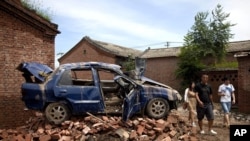Chinese Internet users are criticizing the lack of preparedness and reliable information following the torrential rains that recently hit Beijing and its surroundings. Some of the heaviest rainfall recorded in decades has killed at least 37 people. Internet users have been posting videos and pictures of the worst ravaged areas and citizens have been organizing volunteer relief missions.
State media reported Wednesday that Beijing’s Communist Party Secretary, Guo Jinlong, and his deputy, Li Jin, resigned from their posts. Official reports did not clarify the reasons for the officials’ leaving, but some Chinese “netizens” speculate that mismanagement of the rain storm was behind the leadership’s reshuffle.
“A big rain hits, and two city chiefs resign,” an Internet user posted in his microblog account Wednesday. Searches for both outgoing leaders’ names appear to be blocked on Weibo, China’s most popular Twitter-like service.
The rainfall, which the Ministry of Civil Affairs says affected 22 provincial regions in China since July 20, peaked in Beijing on Saturday. It left many main roads flooded, some submerged by water as deep as four meters and paralyzed traffic in the city center for several hours.
Outer rural districts experienced the worst consequences, with people killed by collapsed buildings and overflowing rivers. City officials say that 37 people died following the rainstorm and more than 77 thousand others were forced to evacuate.
Shu Taifeng, a prominent journalist and commentator, is in mountainous Fangshan district, one of the worst hit by the rain storm, and has been posting regular updates and pictures of what he has witnessed.
“The neighborhood still has no water or electricity and silt is accumulating. The government sent cabbage yesterday, but with no gas it cannot be cooked,” he wrote Wednesday on his microblog account, uploading the picture of a woman standing in the midst of ruins.
Shu says volunteers have brought mineral water. The residents are moved, but are calling for the government to be more responsible and provide water and electricity.
The municipal government has allocated more than $15 million in relief funds and volunteers have set up unofficial donation centers.
Antonio Li, a native of Fangshan district, traveled from his university in Beijing to the village of Beicheying with other volunteers, in five cars filled with daily necessities. Although the village he went to did not have casualties, he calls what he saw a “complete mess.”
He says contents of homes were flushed away and cars and even the iron doors were washed away.
Li, who has been posting updates with pictures of his trip to Fangshan, says that he has seen many other volunteers at the village, including a group of about 30 fans of Beijing’s football team, Guoan.
Li says that, although the government has not acted timely in alerting the population of the danger, it is now helping by sending water and fixing the roads.
The alert level remains high, with more rain expected to hit the capital later Wednesday and Thursday. The Beijing Meteorological Bureau warns of possible further damage in areas like Fangshan, already heavily hit.
"All the things inside the homes were flushed away, the cars and even the iron doors were washed away by the water," Antonio Li said.
State media reported Wednesday that Beijing’s Communist Party Secretary, Guo Jinlong, and his deputy, Li Jin, resigned from their posts. Official reports did not clarify the reasons for the officials’ leaving, but some Chinese “netizens” speculate that mismanagement of the rain storm was behind the leadership’s reshuffle.
“A big rain hits, and two city chiefs resign,” an Internet user posted in his microblog account Wednesday. Searches for both outgoing leaders’ names appear to be blocked on Weibo, China’s most popular Twitter-like service.
The rainfall, which the Ministry of Civil Affairs says affected 22 provincial regions in China since July 20, peaked in Beijing on Saturday. It left many main roads flooded, some submerged by water as deep as four meters and paralyzed traffic in the city center for several hours.
Outer rural districts experienced the worst consequences, with people killed by collapsed buildings and overflowing rivers. City officials say that 37 people died following the rainstorm and more than 77 thousand others were forced to evacuate.
Shu Taifeng, a prominent journalist and commentator, is in mountainous Fangshan district, one of the worst hit by the rain storm, and has been posting regular updates and pictures of what he has witnessed.
“The neighborhood still has no water or electricity and silt is accumulating. The government sent cabbage yesterday, but with no gas it cannot be cooked,” he wrote Wednesday on his microblog account, uploading the picture of a woman standing in the midst of ruins.
Shu says volunteers have brought mineral water. The residents are moved, but are calling for the government to be more responsible and provide water and electricity.
The municipal government has allocated more than $15 million in relief funds and volunteers have set up unofficial donation centers.
Antonio Li, a native of Fangshan district, traveled from his university in Beijing to the village of Beicheying with other volunteers, in five cars filled with daily necessities. Although the village he went to did not have casualties, he calls what he saw a “complete mess.”
He says contents of homes were flushed away and cars and even the iron doors were washed away.
Li, who has been posting updates with pictures of his trip to Fangshan, says that he has seen many other volunteers at the village, including a group of about 30 fans of Beijing’s football team, Guoan.
Li says that, although the government has not acted timely in alerting the population of the danger, it is now helping by sending water and fixing the roads.
The alert level remains high, with more rain expected to hit the capital later Wednesday and Thursday. The Beijing Meteorological Bureau warns of possible further damage in areas like Fangshan, already heavily hit.
"All the things inside the homes were flushed away, the cars and even the iron doors were washed away by the water," Antonio Li said.






